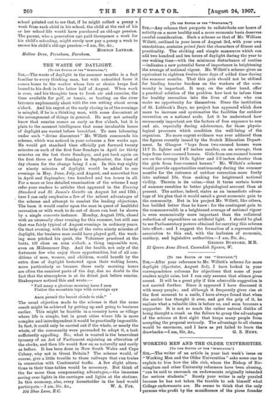THE WASTE OF DAYLIGHT.
[To THE EDITOR OF THE " SPECTATOR." I SIR,—The waste of daylight in the summer months is a fact familiar to every thinking man, but with redoubled force it cornea home to the worker whom fate or choice keeps fast bound to his desk in the latter half of August. When work is over, and his thoughts turn to fresh air and exercise, the time available for golf, or tennis, or boating on the river becomes unpleasantly short with the sun setting about seven o'clock. And his regret at the early closing in of the evenings is mingled, if he is a thinking man, with some discontent at the arrangement of things in general. He may not actually know that sunrise comes as early as five o'clock, but it is plain to the meanest intelligence that some invaluable hours of daylight are wasted before breakfast. To men labouring under such " divine discontent" Mr. Willett commends his scheme, which was noticed in your columns a few weeks ago. He would get standard time officially put forward twenty minutes on each of the first four Sundays in April (or thirty minutes on the last three Sundays), and put back again on the first three or four Sundays in September, the time of day chosen for the change being 2 a.m. In this way eighty or ninety minutes of daylight would be added to our evenings in May, June, July, and August, and somewhat less in April and September, two hundred and ten hours in all. For a more or less detailed examination of the scheme I may refer your readers to articles that appeared in the Evening Standard and St. James's Gazette on August 1st and 13th ; here I can only emphasise a few of the salient advantages of the scheme and attempt to combat the leading objections. The boon it would confer upon the man in quest of healthful recreation or with work, to do out of doors can best be shown by a single concrete instance. Monday, August 19th, closed with an unusually clear evening for this summer, but still one that was fairly typical of August evenings in ordinary years. On that evening, with the help of the extra ninety minutes of daylight, the business man could have played golf, the work- ing man pitched his quoit, the Volunteer practised at the butts, till close on nine o'clock, a thing impossible now, even on Midsummer Day. And the health, not only of the fortunate few who enjoy these opportunities, but of all con- ditions of men, women, and children, would benefit by the extra dose of daylight bestowed upon their waking hours, more particularly so because these early morning hours are often the sunniest parts of the day, due no doubt to the fact that the atmosphere is at its driest just before sunrise. Shakespeare noticed this and wrote :-
" Full many a glorious morning have I seen Flatter the mountain tops with sovereign eye Anon permit the basest clouds to ride."
The usual objection made to the scheme is that the same result might be achieved by getting up and going to business earlier. This might be feasible in a country town or village where life is simple, but in great cities where life is more complex and interdependent it would be practically impossible. In fact, it could only be carried out if the whole, or nearly the whole, of the community were persuaded to adopt it, a task sufficiently appalling. No; what is wanted is the benevolent tyranny of an Act of Parliament enjoining an alteration of the clocks, and then life would flow on as naturally and easily as before. It has been done in New South Wales and Cape Colony, why not in Great Britain ? The scheme would, of course, give a little trouble to those railways that run trains in connexion with Continental traffic. A few slight altera- tions in their time-tables would be necessary. But think of the far more than compensating advantages,—the immense saving over lights in the carriages and lights at the stations. In this economy, also, every householder in the land would


































 Previous page
Previous page